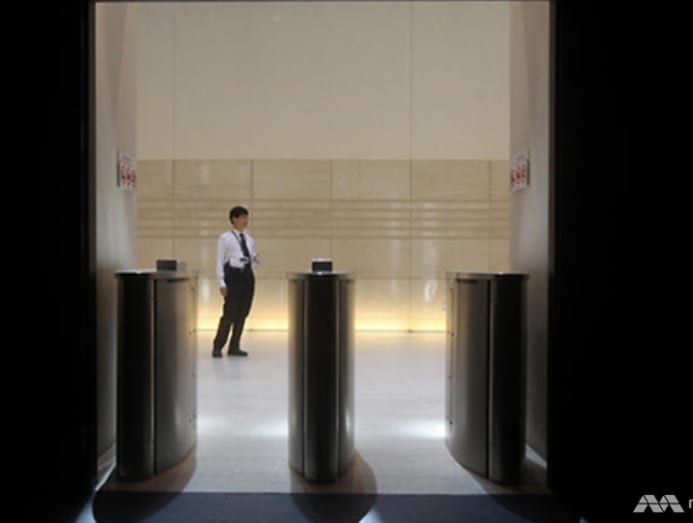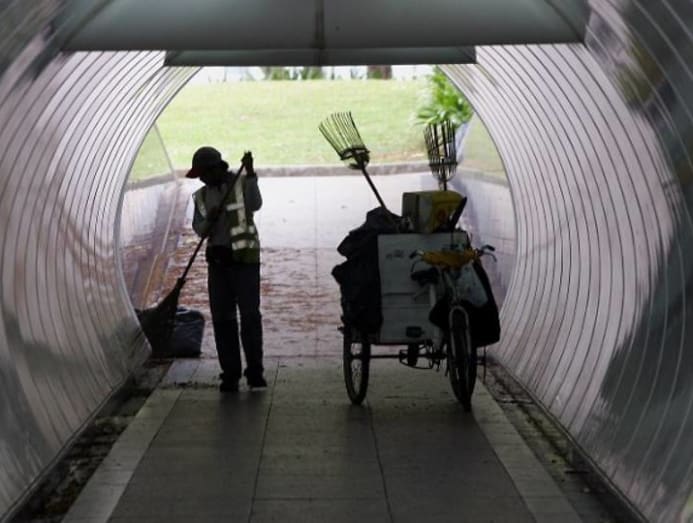Commentary: Small changes, big differences for a left-behind security guard and a hospital cleaner
SINGAPORE: Shan Shan* approached one of our family service centres a number of years agone seeking financial aid for her children.
Her husband's mental health condition had deteriorated and he was no longer able to remain employed.
As a result, she became the sole breadwinner for her household of 5. Shan Shan had been working in a infirmary equally a cleaner for a few months when she approached us for assistance.
READ: Commentary: Catalysing help to overcome inequality in all its forms
She shared that because she spoke little English, she was afraid that she would not be able to collaborate with her colleagues in the hospital, specially her supervisors, the nurses and the other professionals.
A CARING SUPERVISOR
A few months into her new job at the hospital, however, Shan Shan's supervisor, Raja*, began to take notice of her performance. He saw that she was able to complete her duties promptly and had an fantabulous work attitude.
Raja took it upon himself to program and consider ways to aid Shan Shan progress in her career. Raja had only a main school education and had ever struggled to find better paying jobs in the service industry.
When Raja first started working at the infirmary, his supervisor identified his strengths and helped him find progress in his career.
READ: Commentary: A wake-up call, when a disadvantaged child gets 8 out of 100 for an exam
Because of his feel, Raja believed extending that same helping hand should be something natural he likewise does for Shan Shan.
Furthermore, the hospital had an internal skills upgrading plan in place, and Raja made a recommendation for Shan Shan to be placed on the programme.
TRAINING

In the following two to three years, Shan Shan went through on-the-task training, external training courses and coaching to help her learn the ropes of a healthcare assistant.
Shan Shan struggled with juggling going for training courses and caring for her husband and immature children at the same time.
Still, considering of the support she received in her workplace from her colleagues, equally her social worker, I was able to focus on helping Shan Shan procure community resources to manage her caregiving responsibilities.
READ: Commentary: Burden of caring for ageing parents weighs heaviest on unmarried daughters
I too spent time helping Shan Shan discover new ways to manage her caregiving and work stress, and provided counselling to tide her through difficult periods at piece of work and at home.
Shan Shan somewhen successfully completed her training and became a healthcare assistant. In addition to earning a better income, Shan Shan'south mood improved tremendously and she was mostly happier and more confident.
Not SO FORTUNATE
On the other paw, Daniel*, another client at our family service centre, wasn't and then fortunate. Daniel works long hours as a security baby-sit. The hours are demanding and the work is exhausting.
Considering of manpower constraints, Daniel often skips meals or takes only quick lunches during his shift piece of work.
Even if he manages a lunch interruption, he does not have a identify to residuum. What bothers Daniel most is the low income he draws. Information technology does not permit him to provide sufficiently for his family of 4.

Daniel spoke often about how he establish it difficult to secure a higher paying job considering of his low educational qualifications. I asked Daniel from time to time if he had considered going for courses conducted past the various adult grooming centres in Singapore to equip himself with supervisory skills.
This way, he could at some signal exist promoted to a security supervisor, earning himself a better bacon.
I as well asked Daniel if his supervisor had encouraged him to go for courses and spoken to him on how he tin progress in his career.
READ: Commentary: In this tough task market, retraining alone is no silvery bullet
But Daniel often looked uncomfortable when I raised these issues. The visitor he works for is a small one, he reminded me.
He and his colleagues are always putting in overtime hours to cope with the number of projects the company has acquired. No one has time to think about going for courses, he said.
In addition, Daniel shared he found information technology hard to sit in class for long hours and stressful to take the compulsory assessments at the finish of the courses.
"I never did well in school", he lamented. In as much equally the journey to upgrading may announced straightforward to many of united states, to people like Daniel, it is an emotional, fearful and anxiety-provoking experience.
MORE Money IN THEORY, BUT Applied SUPPORT NEEDED
With the implementation of the Ministry building of Manpower's Progressive Wage Model for the security sector in 2016, both Shan Shan and Daniel at present receive more income every month.

All the same, I noticed Shan Shan looked happier and sounded more confident about her work and financial situation compared to Daniel. She attributed this to the back up she received from her supervisor and her workplace.
Shan Shan's workplace had what human resources experts phone call a "growth culture" – a civilization that values learning every bit a priority for everyone and all squad members feel a sense of purpose in the piece of work they do.
Employees believe they are contributing in meaningful means to the whole system.
READ: Commentary: Stuck in a pointless chore, many employees are tuning out
While in that location are many skills upgrading programmes available, employees thrive in workplaces that have their interest at heart. They do ameliorate in workplaces that create and implement learning and development structures that would help them achieve their aspirations.
News of new guidelines for companies to provide proper rest areas are also a right step in the direction to better the work environment of low-wage workers in Singapore.
While these are proficient practices for all employers, the positive impact become beyond college productivity and employee satisfaction. It provides upward mobility for low-wage workers.
EMPLOYERS Make THE DIFFERENCE
Shan Shan and Daniel'south experiences at their workplaces highlight how employers play a big function in helping to boost progress and social mobility in our social club.
Low-wage workers face bigger challenges in keeping up with the fast footstep of change at piece of work. When employers adopt people-axial employment practices, and consider the well-being and potential of their low wage workers, they get a ameliorate shot at life.

Daniel's progress and feel could have been so much dissimilar if only his workplace recognises and supports the development of his abilities the fashion Shan Shan'south employer does.
Even small actions by employers tin have an immense impact when it concerns the lives of depression-wage workers.
They take a big stake in the development of an enabling environs where everyone of united states feels supported and encouraged to do our best to realise our potential and contribute back to the workplace.
Cindy Ng is Head, MWS Family unit Service Centre – Tampines & Yishun at Methodist Welfare Services, and a social worker with all-encompassing experience working with low-income families and persons experiencing violence and abuse.
*Names used in this commentary are pseudonyms.
Source: https://cnalifestyle.channelnewsasia.com/commentary/commentary-small-changes-big-differences-left-behind-security-guard-and-hospital-cleaner-282386
0 Response to "Commentary: Small changes, big differences for a left-behind security guard and a hospital cleaner"
Post a Comment